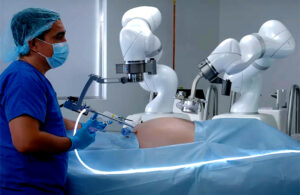
Levita Magnetics founder, CEO and President Dr. Alberto Rodriguez-Navarro [Photo courtesy of Levita Magnetics]
The rise of glucagon-like peptide-1 (GLP-1) weight loss drugs will likely increase demand for bariatric surgeries in the long run, according to Levita Magnetics founder, CEO and President Dr. Alberto Rodriguez-Navarro.
He’s the latest CEO of a surgical robotics developer to weigh in on how these novel drugs could affect demand for bariatric procedures and the wave of robotic systems being launched to perform them.
In an interview with Medical Design & Outsourcing, Rodriguez-Navarro says he views GLP-1 drugs like Ozempic and Wegovy in the same way as previous advances like intragastric balloons that were hailed as obesity solutions.
“Down the line, you stop using those treatments and the people regain the weight, because obesity’s a multifactorial, very complex disease,” he said.
The drugs are helpful in demonstrating that obesity can be a hormonal problem rather than just a behavioral problem and will help people lose weight, Rodriguez-Navarro said. But the question is whether GLP-1 patients will be able to keep the weight off due to the medication’s high cost, compliance issues, and treatment durability whether patients are on or off the drug.
“It’s impossible to be compliant with that drug for the long term. That’s my opinion — my medical opinion,” he said. “People will start searching for more permanent ways of losing weight, and what is — so far — the most permanent? Bariatric surgery.”

The Levita Magnetics MARS (magnetic-assisted robotic surgery) system uses magnetic forces to control a grasper instrument inside a patient. [Image courtesy of Levita Magnetics]
Levita Magnetics designed its MARS (magnetic-assisted robotic surgery) system for laparoscopic bariatric surgeries and other high-volume abdominal surgeries such as cholecystectomies (gallbladder removal) and prostate and colorectal procedures. Read more from our interview with Rodriguez-Navarro here.
GLP-1 drugs and baratric volumes
Intuitive Surgical, the medtech industry’s leading surgical robotics developer, reported a dip in robotic-assisted bariatric surgeries earlier this year as GLP-1 drugs came onto the scene for weight loss. But Intuitive executives also expect a long-term increase in demand for baratric surgeries due to GLP-1 patients who want longer-lasting results.
“Given compliance issues, cost, side effects, we expect that many of them will not stay on the drugs for longer than a year or two, and at that time will consider bariatric surgery,” Intuitive Chief Medical Officer Dr. Myriam Curet said in October.
Medtronic — the world’s largest device manufacturer — also reported a “modest impact” on the bariatric surgery market from the drugs earlier this year. But executives have concluded GLP-1 drugs are not likely to have much of an impact on Medtronic’s portfolio. That includes bariatric devices as well as the Hugo robotic system, which has not yet won FDA approval but has been used elsewhere in the world for robotic-assisted bariatric procedures.
Finally, Stryker — world’s largest orthopedic device manufacturer — doesn’t make products for bariatric procedure, but sells its Mako surgical robotics system for joint replacements. Stryker executives view GLP-1 drugs as a neutral factor or even a positive because they could shed pounds from patients who would otherwise be too heavy for joint replacement procedures.
Related: The best medtech innovations of 2023